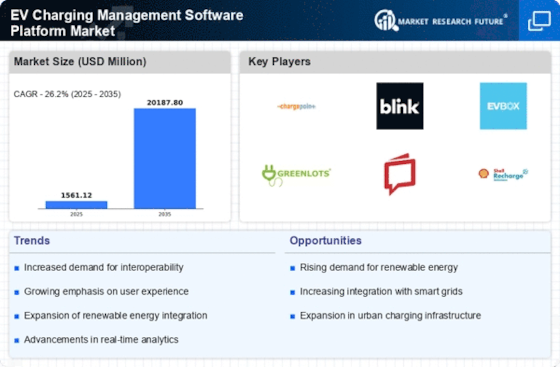Market Trends
Key Emerging Trends in the EV Charging Management Software Platform Market
The market trends of Electric Vehicle (EV) Charging Management Software Platform are witnessing significant growth and evolution in recent times. As the demand for electric vehicles continues to rise, there's a corresponding surge in the need for efficient charging infrastructure and management solutions. One prominent trend is the increasing adoption of smart charging management software platforms by both businesses and consumers. These platforms offer features such as remote monitoring, billing management, and scheduling, allowing users to optimize their charging processes.
Another notable trend is the integration of renewable energy sources into EV charging infrastructure. Many charging management software platforms now support the integration of solar panels and other renewable energy sources, enabling eco-friendly charging solutions. This aligns with the broader trend of sustainability and green initiatives in the transportation sector.
Interoperability is also becoming a crucial factor in the EV charging management software platform market. With various EV manufacturers and charging station operators implementing different standards and protocols, there's a growing need for interoperable solutions that can work across different networks. Standards like Open Charge Point Protocol (OCPP) are gaining traction as they facilitate seamless communication between charging stations and management software platforms.
Moreover, the rise of electric vehicle fleets in commercial sectors is driving the demand for advanced fleet management features in charging software platforms. These features include route optimization, vehicle tracking, and centralized billing, helping fleet operators streamline their operations and reduce costs.
In addition, data analytics and artificial intelligence (AI) are playing an increasingly important role in EV charging management software platforms. These technologies enable predictive maintenance, energy optimization, and demand forecasting, allowing charging operators to improve efficiency and reliability while reducing downtime.
Furthermore, the market is witnessing a shift towards cloud-based solutions, which offer scalability, flexibility, and cost-effectiveness compared to traditional on-premises software. Cloud-based platforms enable real-time monitoring and updates, ensuring that charging infrastructure remains up-to-date with the latest features and security patches.
Security concerns are also driving innovation in the EV charging management software platform market. With the proliferation of connected devices and the potential risks of cyber threats, there's a growing emphasis on implementing robust security measures such as encryption, authentication, and intrusion detection to safeguard charging infrastructure and user data.
Lastly, regulatory developments and government incentives are influencing the market dynamics of EV charging management software platforms. Many governments around the world are implementing policies to promote electric vehicle adoption, including subsidies for charging infrastructure deployment and regulations mandating the installation of charging stations in new buildings and developments. These initiatives create opportunities for software vendors and charging operators to expand their market presence and offerings.
In conclusion, the EV charging management software platform market is experiencing rapid growth and innovation driven by factors such as the increasing adoption of electric vehicles, sustainability initiatives, interoperability requirements, fleet electrification, data analytics, cloud computing, security concerns, and regulatory developments. As the market continues to evolve, software vendors and charging operators will need to stay abreast of these trends and adapt their offerings to meet the changing needs of customers and stakeholders.


















Leave a Comment